Aug 2008
Top 10 televised political convention moments
08/21/08 11:21
By ED BARK
Representatives of the donkey and elephant parties will be stampeding into Denver and St. Paul during the next two weeks to hold their quadrennial national conventions.
The Democrats go first, staring April 25th, with the Republicans right on their heels (Sept. 1-4). Here's a top 10 countdown of televised moments to remember from previous conventions. Some are odd, others eventful. All made their marks.
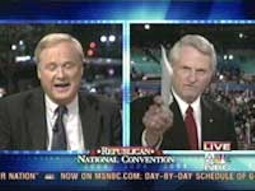
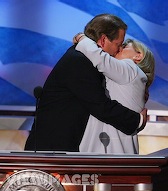
10. Matthews vs. Miller -- Two blowhards had a head-on collision after former Democratic senator Zell Miller of Georgia ripped into his old party as the keynote speaker at the 2004 Republican convention. MSNBC Hardball host Chris Matthews then questioned Miller's insinuation that Democratic nominee John Kerry intended to defend the nation with "spitballs" after voting against various defense systems. During a live exchange, an increasingly angry Miller finally told his antagonist, "I wish we lived in the day where you could challenge a person to a duel." Matthews milked their confrontation for weeks and of course Saturday Night Live parodied it.
9. Read their lips -- Three seconds seemed like an eternity when nominee Al Gore and wife Tipper locked themselves in an amorous embrace on the final night of the 2000 Democratic convention. "The Kiss" was twitted, dissected and viewed by many as a calculated effort to soften Big Al's robotic, wooden image.
8. And furthermore . . . -- Bill Clinton had his national coming out party on opening night of the 1988 Democratic convention. Instead he threw a slumber party with a widely ridiculed and interminable 32-minute speech in which he put Michael Dukakis' name in nomination. Clinton proved resilient, though, turning his disaster into a triumphant appearance on Johnny Carson's Tonight Show, where he played "Summertime" on his saxophone after the host first made fun of him.
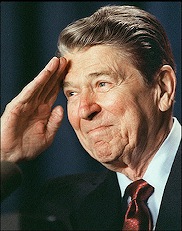
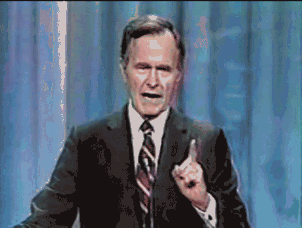
7. Mondale's Waterloo -- The Democrats' 1984 nominee, Walter Mondale, already was seen as a decided underdog to incumbent Ronald Reagan. He then dug his own grave at the 1984 convention with a memorably inept acceptance speech. The former vice president chopped himself off at the knees by telling America, "Mr. Reagan will raise taxes, and so will I. He won't tell you. I just did." Mondale later lost in a landslide.
6. The big brush-off -- Sen. Ted Kennedy feverishly contested President Carter for the Democratic Party's 1980 nomination, but came up shorter than Hillary Clinton's bid to outlast Barack Obama. At the 1980 convention, though, Kennedy remained combative to the end. As Carter and running mate Mondale raised their hands in victory to the tune of "Happy Days Are Here Again," Teddy turned his back on the incumbent president and refused to join him in any visible way. The lack of a conciliatory photo spoke volumes, with Carter eventually denied a second term by Reagan.
5. Last hurrah -- Reagan's final major address, at the 1992 Republican convention, proved to be a bigger event than President George H.W. Bush's acceptance speech in pursuit of a second term. Many wondered whether "The Gipper" was up to it after reports that his mental acuity had greatly waned in the four years since he left office. But Reagan roused the delegates with a typically star-spangled speech. Two years later he was diagnosed with Alzheimer's Disease and faded from public view until his death in 2004.
4. Battle of the four-letter surnames -- The 1980 Republican convention, which coronated Reagan as its nominee, was spiced with rumors that former president Gerald Ford might well be his running mate. Talk of a "co-presidency" dominated convention coverage until Reagan instead chose Bush. Chris Wallace, then with NBC, scooped all of his network rivals by a few precious seconds during one of the few latter day conventions in which actual big news broke out.
3.Death and Taxes, The Sequel -- Nominee George H.W. Bush didn't announce his running mate, Dan Quayle, until the second day of the 1988 Republican convention. Then he made a second big mistake in his acceptance speech by famously declaring, "Read my lips. No new taxes." The "bounce" from that sound bite didn't hurt his campaign against hapless Michael Dukakis. But it bit him hard after he indeed did raise taxes as president. Democratic challenger Clinton pounced on that broken promise and defeated Bush in the 1992 campaign.
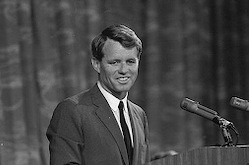
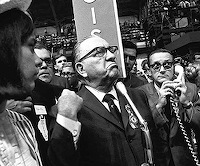
2. His brother's keeper -- No convention speech before or since has been as emotional or riveting as Robert F. Kennedy's at the 1964 Democratic convention. His brother, President John F. Kennedy, had been assassinated in Dallas just nine months earlier. RFK's remarks came after delegates greeted him with a 22-minute ovation which he tried to halt with repeated pleas of "Mr. Chairman." He finally prevailed, quoting both poet Robert Frost and Shakespeare's Romeo and Juliet during an obviously heartfelt introduction of a short film dedicated to his slain brother. There were no dry eyes.
1. "The Whole World is Watching" -- Four years later, the 1968 Democratic convention exploded on home screens in the wake of RFK's recent death at the hands of an assassin. Networks divided coverage between protester-police clashes in the streets and profound discord inside Chicago's International Ampitheatre, where delegates had gathered to more or less nominate Hubert Humphrey.
CBS floor reporter Dan Rather got roughed up on camera in plain view of a television audience. But the most indelible image was mayor Richard J. Daley's visceral reaction to a speech by Sen. Abraham Ribicoff of Connecticut, who denounced the "Gestapo tactics in the streets of Chicago."
Daley gestured angrily at him, shouting "You faker!" among other things.
Humphrey limped away with the nomination, but lost the general election to Richard Nixon. In the eyes of many, his party's raucous convention sealed Humphrey's defeat.
Representatives of the donkey and elephant parties will be stampeding into Denver and St. Paul during the next two weeks to hold their quadrennial national conventions.
The Democrats go first, staring April 25th, with the Republicans right on their heels (Sept. 1-4). Here's a top 10 countdown of televised moments to remember from previous conventions. Some are odd, others eventful. All made their marks.


10. Matthews vs. Miller -- Two blowhards had a head-on collision after former Democratic senator Zell Miller of Georgia ripped into his old party as the keynote speaker at the 2004 Republican convention. MSNBC Hardball host Chris Matthews then questioned Miller's insinuation that Democratic nominee John Kerry intended to defend the nation with "spitballs" after voting against various defense systems. During a live exchange, an increasingly angry Miller finally told his antagonist, "I wish we lived in the day where you could challenge a person to a duel." Matthews milked their confrontation for weeks and of course Saturday Night Live parodied it.
9. Read their lips -- Three seconds seemed like an eternity when nominee Al Gore and wife Tipper locked themselves in an amorous embrace on the final night of the 2000 Democratic convention. "The Kiss" was twitted, dissected and viewed by many as a calculated effort to soften Big Al's robotic, wooden image.
8. And furthermore . . . -- Bill Clinton had his national coming out party on opening night of the 1988 Democratic convention. Instead he threw a slumber party with a widely ridiculed and interminable 32-minute speech in which he put Michael Dukakis' name in nomination. Clinton proved resilient, though, turning his disaster into a triumphant appearance on Johnny Carson's Tonight Show, where he played "Summertime" on his saxophone after the host first made fun of him.


7. Mondale's Waterloo -- The Democrats' 1984 nominee, Walter Mondale, already was seen as a decided underdog to incumbent Ronald Reagan. He then dug his own grave at the 1984 convention with a memorably inept acceptance speech. The former vice president chopped himself off at the knees by telling America, "Mr. Reagan will raise taxes, and so will I. He won't tell you. I just did." Mondale later lost in a landslide.
6. The big brush-off -- Sen. Ted Kennedy feverishly contested President Carter for the Democratic Party's 1980 nomination, but came up shorter than Hillary Clinton's bid to outlast Barack Obama. At the 1980 convention, though, Kennedy remained combative to the end. As Carter and running mate Mondale raised their hands in victory to the tune of "Happy Days Are Here Again," Teddy turned his back on the incumbent president and refused to join him in any visible way. The lack of a conciliatory photo spoke volumes, with Carter eventually denied a second term by Reagan.
5. Last hurrah -- Reagan's final major address, at the 1992 Republican convention, proved to be a bigger event than President George H.W. Bush's acceptance speech in pursuit of a second term. Many wondered whether "The Gipper" was up to it after reports that his mental acuity had greatly waned in the four years since he left office. But Reagan roused the delegates with a typically star-spangled speech. Two years later he was diagnosed with Alzheimer's Disease and faded from public view until his death in 2004.
4. Battle of the four-letter surnames -- The 1980 Republican convention, which coronated Reagan as its nominee, was spiced with rumors that former president Gerald Ford might well be his running mate. Talk of a "co-presidency" dominated convention coverage until Reagan instead chose Bush. Chris Wallace, then with NBC, scooped all of his network rivals by a few precious seconds during one of the few latter day conventions in which actual big news broke out.
3.Death and Taxes, The Sequel -- Nominee George H.W. Bush didn't announce his running mate, Dan Quayle, until the second day of the 1988 Republican convention. Then he made a second big mistake in his acceptance speech by famously declaring, "Read my lips. No new taxes." The "bounce" from that sound bite didn't hurt his campaign against hapless Michael Dukakis. But it bit him hard after he indeed did raise taxes as president. Democratic challenger Clinton pounced on that broken promise and defeated Bush in the 1992 campaign.


2. His brother's keeper -- No convention speech before or since has been as emotional or riveting as Robert F. Kennedy's at the 1964 Democratic convention. His brother, President John F. Kennedy, had been assassinated in Dallas just nine months earlier. RFK's remarks came after delegates greeted him with a 22-minute ovation which he tried to halt with repeated pleas of "Mr. Chairman." He finally prevailed, quoting both poet Robert Frost and Shakespeare's Romeo and Juliet during an obviously heartfelt introduction of a short film dedicated to his slain brother. There were no dry eyes.
1. "The Whole World is Watching" -- Four years later, the 1968 Democratic convention exploded on home screens in the wake of RFK's recent death at the hands of an assassin. Networks divided coverage between protester-police clashes in the streets and profound discord inside Chicago's International Ampitheatre, where delegates had gathered to more or less nominate Hubert Humphrey.
CBS floor reporter Dan Rather got roughed up on camera in plain view of a television audience. But the most indelible image was mayor Richard J. Daley's visceral reaction to a speech by Sen. Abraham Ribicoff of Connecticut, who denounced the "Gestapo tactics in the streets of Chicago."
Daley gestured angrily at him, shouting "You faker!" among other things.
Humphrey limped away with the nomination, but lost the general election to Richard Nixon. In the eyes of many, his party's raucous convention sealed Humphrey's defeat.
Top 10 all-time TV flops
08/11/08 09:20
By ED BARK
Hope springs eternal each fall. At least in TV land it does.
We're nearing that time again, with every last new series deemed a must-see mega-hit until Nielsen Media Research's grim reaper ratings say otherwise.
Shows with big names attached take the hardest falls. So let's revisit 10 monumental flops whose big buildups and budgets went for naught.
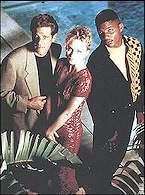
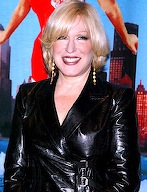
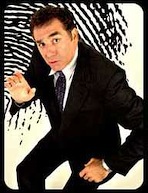
10. South of Sunset (1993) -- One and done. CBS thought it could turn Glen Frey of The Eagles into a wisecracking, up-against-it Los Angeles private eye named Cody McMahon. But the opening night ratings were subterranean, prompting the network to let the sun set on Frey's acting ambitions after just a single episode.
9. Bette (2000) -- "The Divine Miss M" starred as a thinly disguised caricature of herself in a lame-o sitcom in which her 12-year-old daughter Rose was played in the first episode only by Lindsay Lohan. Cripes, even then she apparently was difficult. CBS called off all Bettes five months later after audience levels drooped despite big-name guest appearances by the likes of Oprah Winfrey, Tony Danza, Dolly Parton and Danny DeVito.
8. The Michael Richards Show (2000) -- First to launch a post-Seinfeld series, Richards bombed as hapless L.A. detective Vic Nardozza in a comedy series that was worked and reworked to no avail before NBC somehow saw fit to air it. Also going down with the ship were co-stars William Devane and Tim Meadows in his first post-Saturday Night Live effort to branch out.
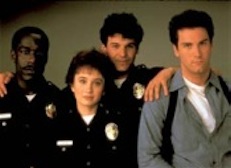
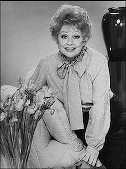

7. Cop Rock (1990) -- Executive producer Steven Bochco already had Hill Street Blues and L.A. Law in the bank when he persuaded ABC to take a chance on a musical drama about hard-edged cops and crooks who broke into song on a moment's notice. It lasted three months before the network thoughtfully aired the last episode on Christmas Day. Co-star James McDaniel eventually recovered to become a regular in Bochco's NYPD Blue. But the producer's wife, Barbara Bosson, who played Mayor Louise Plank, went on to become his ex-wife.
6. Life With Lucy (1986) -- At age 75, the undisputed Queen of Comedy made a major miscalculation in making one last grab at the brass ring. Her old writers, longtime comedy foil Gale Gordon and ABC potentate Aaron Spelling also jumped on board. Less than two months later, ABC mercifully called an end to it. Viewers just didn't want to see their beloved Lucy as a peppy, clumsy grandma who split time between a hardware store and babysitting her young grandchildren.
5. Mary (1978) -- Just a year removed from the glory of The Mary Tyler Moore Show, the star tried her hand at comedy-variety with a one-hour series whose repertory company included then newcomers David Letterman, Michael Keaton and Swoosie Kurtz. Moore obviously had a good eye for talent, but the show lasted for just three episodes on CBS. Its executive producer, Grant Tinker, who was Moore's husband at the time, went on to become chairman of NBC.
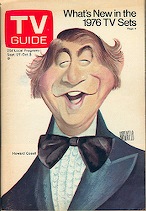
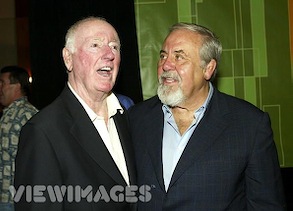
4. Saturday Night Live with Howard Cosell (1975) -- Imagine "Humble Howie" introducing The Bay City Rollers as his inaugural musical guest. ABC's ballyhooed attempt to make Cosell the next Ed Sullivan became a fiasco for all seasons despite weekly guest appearances by a parade of A-listers from both the show business and sports worlds. Frank Sinatra, John Wayne and Andy Williams dropped in, as did Evel Knievel, Jimmy Connors and Muhammad Ali and Joe Frazier via satellite on the night before their "Thrilla in Manila." NBC's Saturday Night Live, which premiered just three weeks later, has managed to last a bit longer.
3. Turn-On (1969) -- ABC envisioned an irreverent counterpart to NBC's Laugh-In when it hired that show's executive producer, George Schlatter (pictured above with Dick Martin), to pull the strings. This didn't work too well. Rife with sexual double entendres, Turn-On reportedly was turned off by at least one ABC affiliate in mid-show. The network then followed suit after just one episode, leaving a mostly no-name ensemble company in the lurch and opening night guest star Tim Conway as an off-center trivia question.
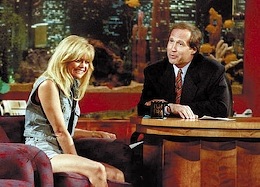
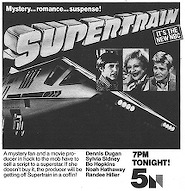
2. The Chevy Chase Show (1993) -- The late night terrain shifted big-time in fall 1993, with David Letterman jumping from NBC to CBS, Conan O'Brien replacing him and Fox hoping to capitalize with Chevy Chase behind a desk. No high-priced late nighter has ever bombed bigger. Chevy, who turned out to be an Edsel, lasted just six weeks before scathing reviews and comatose ratings led to terminal transmission problems. Fox had even built the host his own theater, including a behind-the-desk fish tank. Tanked was the word, all right.
1. Supertrain (1979) -- NBC's answer to The Love Boat remains the gold standard for mega-flops. The Peacock spared no expense in building a luxury rail-rider complete with swimming pool, steam room and discotheque. Conductor Harry Flood, played by Edward Andrews, was supposed to be the next Cap. Stubing. But the show quickly chug-a-chugged to ratings oblivion despite a carousel of guest passengers played by the likes of Zsa Zsa Gabor, George Hamilton, Jamie Farr, Dick Van Dyke, Loretta Swit and Don Meredith. What, no Charo? Maybe that was the problem.
Hope springs eternal each fall. At least in TV land it does.
We're nearing that time again, with every last new series deemed a must-see mega-hit until Nielsen Media Research's grim reaper ratings say otherwise.
Shows with big names attached take the hardest falls. So let's revisit 10 monumental flops whose big buildups and budgets went for naught.



10. South of Sunset (1993) -- One and done. CBS thought it could turn Glen Frey of The Eagles into a wisecracking, up-against-it Los Angeles private eye named Cody McMahon. But the opening night ratings were subterranean, prompting the network to let the sun set on Frey's acting ambitions after just a single episode.
9. Bette (2000) -- "The Divine Miss M" starred as a thinly disguised caricature of herself in a lame-o sitcom in which her 12-year-old daughter Rose was played in the first episode only by Lindsay Lohan. Cripes, even then she apparently was difficult. CBS called off all Bettes five months later after audience levels drooped despite big-name guest appearances by the likes of Oprah Winfrey, Tony Danza, Dolly Parton and Danny DeVito.
8. The Michael Richards Show (2000) -- First to launch a post-Seinfeld series, Richards bombed as hapless L.A. detective Vic Nardozza in a comedy series that was worked and reworked to no avail before NBC somehow saw fit to air it. Also going down with the ship were co-stars William Devane and Tim Meadows in his first post-Saturday Night Live effort to branch out.



7. Cop Rock (1990) -- Executive producer Steven Bochco already had Hill Street Blues and L.A. Law in the bank when he persuaded ABC to take a chance on a musical drama about hard-edged cops and crooks who broke into song on a moment's notice. It lasted three months before the network thoughtfully aired the last episode on Christmas Day. Co-star James McDaniel eventually recovered to become a regular in Bochco's NYPD Blue. But the producer's wife, Barbara Bosson, who played Mayor Louise Plank, went on to become his ex-wife.
6. Life With Lucy (1986) -- At age 75, the undisputed Queen of Comedy made a major miscalculation in making one last grab at the brass ring. Her old writers, longtime comedy foil Gale Gordon and ABC potentate Aaron Spelling also jumped on board. Less than two months later, ABC mercifully called an end to it. Viewers just didn't want to see their beloved Lucy as a peppy, clumsy grandma who split time between a hardware store and babysitting her young grandchildren.
5. Mary (1978) -- Just a year removed from the glory of The Mary Tyler Moore Show, the star tried her hand at comedy-variety with a one-hour series whose repertory company included then newcomers David Letterman, Michael Keaton and Swoosie Kurtz. Moore obviously had a good eye for talent, but the show lasted for just three episodes on CBS. Its executive producer, Grant Tinker, who was Moore's husband at the time, went on to become chairman of NBC.


4. Saturday Night Live with Howard Cosell (1975) -- Imagine "Humble Howie" introducing The Bay City Rollers as his inaugural musical guest. ABC's ballyhooed attempt to make Cosell the next Ed Sullivan became a fiasco for all seasons despite weekly guest appearances by a parade of A-listers from both the show business and sports worlds. Frank Sinatra, John Wayne and Andy Williams dropped in, as did Evel Knievel, Jimmy Connors and Muhammad Ali and Joe Frazier via satellite on the night before their "Thrilla in Manila." NBC's Saturday Night Live, which premiered just three weeks later, has managed to last a bit longer.
3. Turn-On (1969) -- ABC envisioned an irreverent counterpart to NBC's Laugh-In when it hired that show's executive producer, George Schlatter (pictured above with Dick Martin), to pull the strings. This didn't work too well. Rife with sexual double entendres, Turn-On reportedly was turned off by at least one ABC affiliate in mid-show. The network then followed suit after just one episode, leaving a mostly no-name ensemble company in the lurch and opening night guest star Tim Conway as an off-center trivia question.


2. The Chevy Chase Show (1993) -- The late night terrain shifted big-time in fall 1993, with David Letterman jumping from NBC to CBS, Conan O'Brien replacing him and Fox hoping to capitalize with Chevy Chase behind a desk. No high-priced late nighter has ever bombed bigger. Chevy, who turned out to be an Edsel, lasted just six weeks before scathing reviews and comatose ratings led to terminal transmission problems. Fox had even built the host his own theater, including a behind-the-desk fish tank. Tanked was the word, all right.
1. Supertrain (1979) -- NBC's answer to The Love Boat remains the gold standard for mega-flops. The Peacock spared no expense in building a luxury rail-rider complete with swimming pool, steam room and discotheque. Conductor Harry Flood, played by Edward Andrews, was supposed to be the next Cap. Stubing. But the show quickly chug-a-chugged to ratings oblivion despite a carousel of guest passengers played by the likes of Zsa Zsa Gabor, George Hamilton, Jamie Farr, Dick Van Dyke, Loretta Swit and Don Meredith. What, no Charo? Maybe that was the problem.
Top 10 all-time network sportscasters
08/07/08 11:04
By ED BARK
All hail the Games of the XXIX Olympiad, or simply the Summer Olympics if you prefer. They'll be a dominant force on NBC from Aug. 8-24th.
All of this athletic pomp and pageantry prompts a list of the 10 most influential and capable network sportscasters of all time. We're excluding regional hits, so sorry about that, Harry Carey, Ernie Harwell, Jack Brickhouse and Jack Buck among others. Let's play ball.
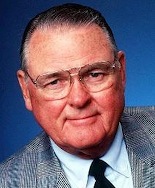
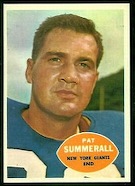
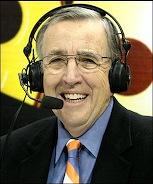
10. Keith Jackson -- Whoa Nelly, he keeps retiring and unretiring. But ABC's original Monday Night Football play-by-play guy still has a big strapping buck of a voice that raises pulses during major college football matchups. He also worked a good number of Olympics telecasts back when ABC owned the broadcast rights.
9. Pat Summerall -- The best ex-jock ever to hit a broadcast booth excelled as a kicker for the New York Giants before famously teaming with Tom Brookshier and later John Madden as the resident A-list pro football announcer for both CBS and Fox. His minimalist approach meshed well with gabbier sidekicks. And he also covered the premier golf and tennis tournaments carried on CBS.
8. Brent Musberger -- The former minor league umpire first came to prominence as CBS' NFL Today studio show host alongside Irv Cross, Phyllis George and Jimmy "The Greek" Snyder. But he soon began going to the games themselves, flexing a "You are looking live . . . " tagline at a wide variety of major events. Bounced by CBS in 1990, he rebounded to ABC/ESPN, where he's still calling major college games as part of a Saturday night prime-time package. Some can't stand him, but he's stood the test of time.
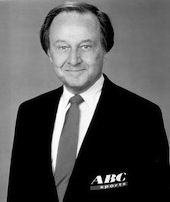
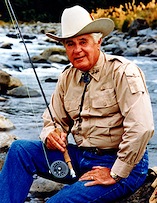
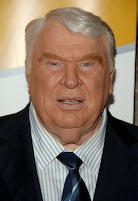
7. Jim McKay -- The late great ABC broadcaster first branded himself as host of the network's innovative Wide World of Sports series, where "the thrill of victory and the agony of defeat" became his lasting catchphrase. He also was a key player in coverage of 12 Olympics, most notably the tragic 1972 games in Munich, where 11 Israeli athletes were murdered by terrorists. "They're all gone," a drained McKay said somberly after 14 consecutive hours on the air. He capped his career as a "special correspondent" for NBC during that network's coverage of the 2002 Winter Olympics in Salt Lake City.
6. Curt Gowdy -- People forget how big he was, serving as NBC's go-to guy for virtually every major sports event from the mid-1960s to the late 1970s after announcing the first five seasons of the American Football League on ABC. Gowdy covered World Series, Super Bowls, Rose Bowls, the Olympics, NCAA Final Four basketball tournaments, you name it. He also was at the mike when Hank Aaron hit his historic 715th home run on April 8, 1974. Gowdy's American Sportsman series for ABC was another long-distance runner. And he hosted PBS' well-regarded The Way It Was sports anthology series, which reunited famous athletes involved in classic sports matchups.
5. John Madden -- Oft-parodied but never surpassed, the former Oakland Raiders Super Bowl-winning coach has spanned three decades as network television's foremost pro football color commentator. He's worked at all four major broadcast networks, beginning with CBS and Pat Summerall in 1981. They moved to Fox in 1994 and remained the network's No. 1 team until Madden joined Al Michaels on ABC's Monday Night Football in 2002. They're now the featured duo on NBC's Sunday Night Football. Madden's NFL football video game also is an institution, as are his yearly "All-Madden" teams.
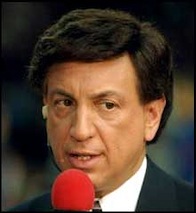
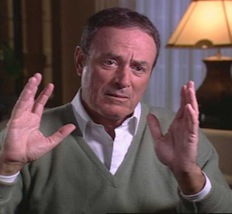
4. Marv Albert -- An ill-fitting toupee and a super-embarrassing sex scandal haven't stopped him from being the world's all-time greatest NBA announcer. His two timeless taglines -- "Yessssss" and "From downtown" -- only get better with age. Albert also is the national radio voice of Monday Night Football and knows his way around a hockey rink, too. And his tongue-in-cheek "Albert Achievement Awards" have been a recurring feature on David Letterman's late night talkers. No one has a more distinctive or immediately recognizable play-by-play voice.
3. Al Michaels -- "Do you believe in miracles? Yes!" Need we say more? Michaels' climactic exclamation after the U.S. hockey team's "Miracle On Ice" win over Russia at the 1980 Olympics arguably is the single most famous call in televised sports history. He joined ABC's Monday Night Football as its principal play-by-play announcer in 1986 and stayed until the network punted its longtime sports meal ticket to ESPN after the 2005 season. Michaels originally said he'd make the move to ESPN but instead jumped to NBC to re-team with John Madden on the Peacock's new Sunday Night Football. Michaels remains one of the booth's smoothest operators, now almost exclusively as a pigskin poet. But he's also done a pair of World Series and NBA Finals.
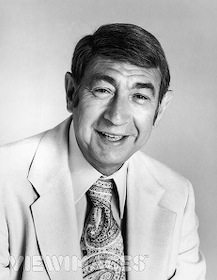
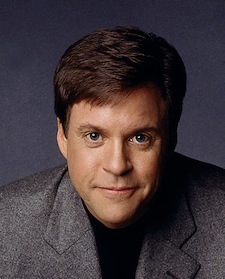
2. Howard Cosell -- ABC's legendary big-eared bigmouth never minded telling you he knew it all. He didn't, but nobody has ever been more fun to love/hate. Initially a lawyer by trade, Cosell first made his mark in athletic circles as host of the nationally syndicated radio show Speaking of Sports. His coverage of Cassius Clay/Muhammad Ali then made him a full-blown star who seldom failed to remind audiences that "I'm just telling it like it is." But his most famous boxing call -- "Down goes Frazier! Down goes Frazier! -- came during a 1973 heavyweight title bout between Joe Frazier and George Foreman.
Cosell's subsequent stint as a charter member of ABC's Monday Night Football announcing team provided him with a perfect foil in "Dandy" Don Meredith. But there was no fun and games on the night of Dec. 8, 1980, when Cosell told his football audience of the shooting death of John Lennon. Cosell also authored several bestselling books and hosted the ill-conceived ABC prime-time variety show, Saturday Night Live with Howard Cosell. He became increasingly bitter and boorish in later years. But at his zenith there was no one like him. And there hasn't been since.
1. Bob Costas -- Settling in to be NBC's point man for another Olympics extravaganza, Costas has no peer as a stage-setter or sports interviewer. Baseball remains his first love, and there's no one more knowledgeable about the game. But Costas has been without a baseball venue for way too long, His most memorable baseball "call" came out of the booth when he eulogized Mickey Mantle at his funeral in Dallas.
Costas also helmed HBO's recently defunct Inside the NFL for many years and continues to host an acclaimed sports interview program on the pay cable network. From 1988-'94, his Later with Bob Costas late night program on NBC afforded him a chance to talk in-depth with a wide array of sports and non-sports notables. Whatever the venue, viewers are always in good hands with the brightest guy in the room.
All hail the Games of the XXIX Olympiad, or simply the Summer Olympics if you prefer. They'll be a dominant force on NBC from Aug. 8-24th.
All of this athletic pomp and pageantry prompts a list of the 10 most influential and capable network sportscasters of all time. We're excluding regional hits, so sorry about that, Harry Carey, Ernie Harwell, Jack Brickhouse and Jack Buck among others. Let's play ball.



10. Keith Jackson -- Whoa Nelly, he keeps retiring and unretiring. But ABC's original Monday Night Football play-by-play guy still has a big strapping buck of a voice that raises pulses during major college football matchups. He also worked a good number of Olympics telecasts back when ABC owned the broadcast rights.
9. Pat Summerall -- The best ex-jock ever to hit a broadcast booth excelled as a kicker for the New York Giants before famously teaming with Tom Brookshier and later John Madden as the resident A-list pro football announcer for both CBS and Fox. His minimalist approach meshed well with gabbier sidekicks. And he also covered the premier golf and tennis tournaments carried on CBS.
8. Brent Musberger -- The former minor league umpire first came to prominence as CBS' NFL Today studio show host alongside Irv Cross, Phyllis George and Jimmy "The Greek" Snyder. But he soon began going to the games themselves, flexing a "You are looking live . . . " tagline at a wide variety of major events. Bounced by CBS in 1990, he rebounded to ABC/ESPN, where he's still calling major college games as part of a Saturday night prime-time package. Some can't stand him, but he's stood the test of time.



7. Jim McKay -- The late great ABC broadcaster first branded himself as host of the network's innovative Wide World of Sports series, where "the thrill of victory and the agony of defeat" became his lasting catchphrase. He also was a key player in coverage of 12 Olympics, most notably the tragic 1972 games in Munich, where 11 Israeli athletes were murdered by terrorists. "They're all gone," a drained McKay said somberly after 14 consecutive hours on the air. He capped his career as a "special correspondent" for NBC during that network's coverage of the 2002 Winter Olympics in Salt Lake City.
6. Curt Gowdy -- People forget how big he was, serving as NBC's go-to guy for virtually every major sports event from the mid-1960s to the late 1970s after announcing the first five seasons of the American Football League on ABC. Gowdy covered World Series, Super Bowls, Rose Bowls, the Olympics, NCAA Final Four basketball tournaments, you name it. He also was at the mike when Hank Aaron hit his historic 715th home run on April 8, 1974. Gowdy's American Sportsman series for ABC was another long-distance runner. And he hosted PBS' well-regarded The Way It Was sports anthology series, which reunited famous athletes involved in classic sports matchups.
5. John Madden -- Oft-parodied but never surpassed, the former Oakland Raiders Super Bowl-winning coach has spanned three decades as network television's foremost pro football color commentator. He's worked at all four major broadcast networks, beginning with CBS and Pat Summerall in 1981. They moved to Fox in 1994 and remained the network's No. 1 team until Madden joined Al Michaels on ABC's Monday Night Football in 2002. They're now the featured duo on NBC's Sunday Night Football. Madden's NFL football video game also is an institution, as are his yearly "All-Madden" teams.


4. Marv Albert -- An ill-fitting toupee and a super-embarrassing sex scandal haven't stopped him from being the world's all-time greatest NBA announcer. His two timeless taglines -- "Yessssss" and "From downtown" -- only get better with age. Albert also is the national radio voice of Monday Night Football and knows his way around a hockey rink, too. And his tongue-in-cheek "Albert Achievement Awards" have been a recurring feature on David Letterman's late night talkers. No one has a more distinctive or immediately recognizable play-by-play voice.
3. Al Michaels -- "Do you believe in miracles? Yes!" Need we say more? Michaels' climactic exclamation after the U.S. hockey team's "Miracle On Ice" win over Russia at the 1980 Olympics arguably is the single most famous call in televised sports history. He joined ABC's Monday Night Football as its principal play-by-play announcer in 1986 and stayed until the network punted its longtime sports meal ticket to ESPN after the 2005 season. Michaels originally said he'd make the move to ESPN but instead jumped to NBC to re-team with John Madden on the Peacock's new Sunday Night Football. Michaels remains one of the booth's smoothest operators, now almost exclusively as a pigskin poet. But he's also done a pair of World Series and NBA Finals.


2. Howard Cosell -- ABC's legendary big-eared bigmouth never minded telling you he knew it all. He didn't, but nobody has ever been more fun to love/hate. Initially a lawyer by trade, Cosell first made his mark in athletic circles as host of the nationally syndicated radio show Speaking of Sports. His coverage of Cassius Clay/Muhammad Ali then made him a full-blown star who seldom failed to remind audiences that "I'm just telling it like it is." But his most famous boxing call -- "Down goes Frazier! Down goes Frazier! -- came during a 1973 heavyweight title bout between Joe Frazier and George Foreman.
Cosell's subsequent stint as a charter member of ABC's Monday Night Football announcing team provided him with a perfect foil in "Dandy" Don Meredith. But there was no fun and games on the night of Dec. 8, 1980, when Cosell told his football audience of the shooting death of John Lennon. Cosell also authored several bestselling books and hosted the ill-conceived ABC prime-time variety show, Saturday Night Live with Howard Cosell. He became increasingly bitter and boorish in later years. But at his zenith there was no one like him. And there hasn't been since.
1. Bob Costas -- Settling in to be NBC's point man for another Olympics extravaganza, Costas has no peer as a stage-setter or sports interviewer. Baseball remains his first love, and there's no one more knowledgeable about the game. But Costas has been without a baseball venue for way too long, His most memorable baseball "call" came out of the booth when he eulogized Mickey Mantle at his funeral in Dallas.
Costas also helmed HBO's recently defunct Inside the NFL for many years and continues to host an acclaimed sports interview program on the pay cable network. From 1988-'94, his Later with Bob Costas late night program on NBC afforded him a chance to talk in-depth with a wide array of sports and non-sports notables. Whatever the venue, viewers are always in good hands with the brightest guy in the room.
